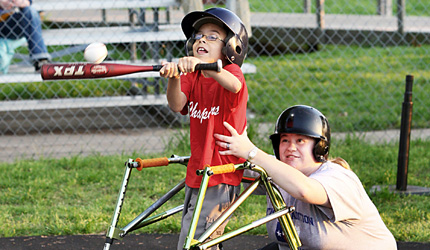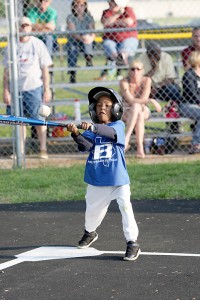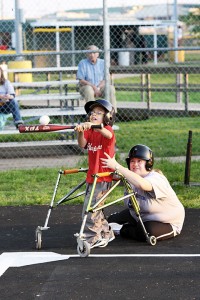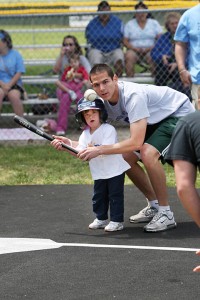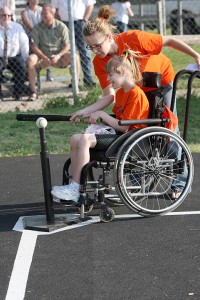Story by Chris Bloom
Photos by Michael Bancale
At Lake Air Challenger Field, the outfielders are is drenched by sweat, soiled with red earth, but nevertheless showcasing their smiling faces while waiting for the ball to come their way. A mother screams with wild joy while her child wheels himself to the home plate with bat in hand. Her face gleams.
Umpire Lupe Rosas stands ready atop the pitcher’s mound. While the boy at bat prepares to swing, Coach Colleen Ostrom shouts words of encouragement from the dugout. And for a moment in the sun, the Challenger League baseball team, for children with special needs, appears like a regular baseball game — because it is.
People like Rosas and Ostrom reflect the nature of the Waco community and set a positive example for its youth. Despite having real-world responsibilities, these individuals make the sacrifices necessary to set aside time to adhere to the needs of others.
“When I was in high school, I volunteered with the special-ed class and I knew that whatever I did with my life, I wanted to do something to help those with special needs,” Ostrom said. “I got involved in Challenger several years ago because I was looking for a way to get plugged in with children with special needs.”
Ostrom’s household responsibilities include her 12-year-old son and husband. Yet she still finds a harmonic balance between these two dynamics: family and service. Of course, Ostrom’s family fully supports her calling to aid Waco’s community, and thus provides her with ease of mind at home and at work.
“My son Austin loves to volunteer with helping the players and the league as I do. He forgoes playing on a regular baseball team with his peers in order to be fully involved in Challenger. Many people think that a disability keeps you from being able to live a ‘normal’ life. That is so untrue. I long for the day when our community becomes knowledgeable that differences or disabilities shouldn’t divide us. We have so much to learn from one another. Everyone should spend a little time with the league and they will see there is nothing like a Challenger League game,” Ostrom said. “And, what is so amazing about the Challenger League is that the children get to be children. It is of course amazing to see the kids’ faces, but it’s amazing to see the parents too. Parents who never thought their children would play ball, but look at them – they’re playing ball.”
The Challenger League provides these disabled children with a venue to showcase their talents and qualities. The severity and kind of disabilities vary greatly from child to child. One child may suffer from a hearing handicap, another child may not have any arms, and another child may suffer from Down syndrome. Regardless, the Challenger League found ways to accommodate these steep ranges of disabilities.
The Challenger League began locally in 1990 with three teams and played on Lake Air Little League’s Field No.2. Eventually, organizations came together and donated space from Lake Air Little League to alleviate the difficulties arising from the dirt base paths. Therefore, the specially designed Challenger Field was built. The field allows full access for all participants, whether they are wheelchair bound or use a walker.
The league has grown to six teams, with “Buddies.” Buddies are volunteers, usually in college or high school, and are randomly placed within one of the various Challenger teams. Many students view the buddy program as a great opportunity to gather community service credits toward the various causes of academia, or simply partake voluntarily. Buddies assist the players on both offense and defense, but more importantly they bond and form positive relationships with the players. Breanna Cummings, a McLennan Community College freshman, volunteered for two years with the Challenger League and found great fulfillment.
“It was so sweet to see the children playing together and working together without a care in the world of the hardships outside the baseball field,” she said. “The laughter and smiles alone makes helping these beautiful people something to look forward to every day.”
Cummings’ 12-year-old brother Brennen Cummings participates in the Challenger League as a player.
“It saddens me to see, sometimes, Brennen at home, because children with Down syndrome cannot normally interact together without supervision outside a school, which means he has few peers he can hang out with,” Cummings said. “When I see him smiling, while playing baseball with all his friends, it makes me happy because he’s getting a chance to fulfill those social needs.”
Likewise, Rosas, a volunteer for the Challenger League since its inception, cherishes his decades of memories.
“Children often come out of the Challenger League with a greater sense of self-confidence and serve as real inspirations to the community,” he said.
Rosas said it’s very rewarding to work with the children and that this particular service teaches people that they can achieve so many things despite all the setbacks in their lives.
“Seeing the kids overcome the obstacles that we take for granted can be humbling.” “One of our coaches, Jimmy Moreno, started as a wheelchair-bound player in the Challenger League. Jimmy now coaches every season, drives a truck, and holds down a full-time job. I’m in awe of people like Jimmy not only because of his large heart, but because Jimmy never complains. He’s a real hero. When Jimmy fell out of his chair, it scared me to death. But he just dusted himself off and kept right on playing.”
Moreno remembers well the mentoring he received decades ago from Rosas.
“I remember Lupe always used to throw the ball at me when I was a kid to make sure I was alert. He’s really cool to hang out with and really great to talk to,” Moreno said. “He really cares about the kids and their safety. A lot of us really look up to him.”
Bound to a wheelchair for life, Moreno made the most of his circumstances.
“The Challenger League has made me more independent. Being in a wheelchair, I used to have people help me all the time. But now I do whatever I can do for myself, by myself. One of my kids, an 8-year-old named Jade Perry, looks up to me as a role model because he knows that I used to play as well. He’s one of my favorite kids.” Moreno urges the Challenger League to continue seeking out volunteers from across the Waco community, including from Baylor University.
Ostrom said, “Jesus loves the children, and one day he will make them able to run without hindrance. The Challenger League will have to be a tiny little piece of heaven until that day comes, and we could use all the help we can get.” Rosas said they would love to see the Challenger League grow into as large of a community as possible.
“I hope that as we grow that our program grows too,” she said. “I would like to see more kids, more people involved with the program, more games and more volunteers.
And the Challenger League could of course use any donations possible since it is purely nonprofit.”

